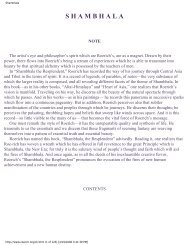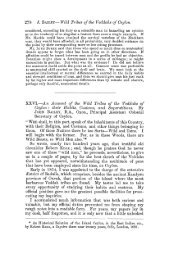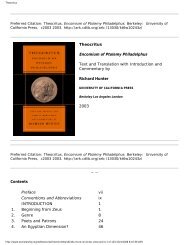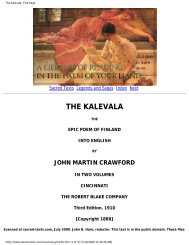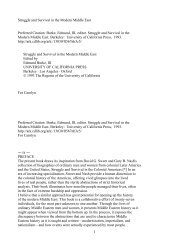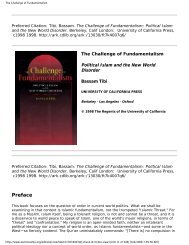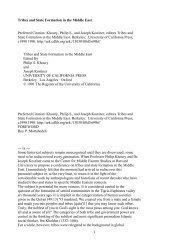Between Two Worlds Kafadar.pdf
Between Two Worlds Kafadar.pdf
Between Two Worlds Kafadar.pdf
You also want an ePaper? Increase the reach of your titles
YUMPU automatically turns print PDFs into web optimized ePapers that Google loves.
40. Akdag * , Týrkiye'nin Iktisadi * ve Ictimai * Tarihi, 2d ed., 2 vols.<br />
(Istanbul, 1974). The original publication date is 1959.<br />
41. See, for instance, the citations from Akdag * in the Introduction, n. 21,<br />
above.<br />
42. Vryonis, The Decline of Medieval Hellenism. Also see his response to the<br />
reviews of this book, "The Decline of Medieval Hellenism ...," Greek Orthodox<br />
Theological Review 27(1982):225-85.<br />
43. Vryonis, "The Decline" 278.<br />
44. Ibid., 262-63.<br />
45. Ernst Werner, Die Geburt einer Grossmacht — Die Osmanen (1300-1481): Ein<br />
Beitrag zur Genesis des türkischeen Feudalismus, 2d ed. (Berlin, 1972). A<br />
Turkish translation, by Y. Öner, was published in 198?-88: Büyük Bir Devletin<br />
Dogusu * — Osmanlilar, 2 vols. (Istanbul).<br />
46. Also see Werner's "Panturkismus und einige Tendenzen moderner türkischer<br />
Historiographie," Zeitschrift für Geschichtswissenschaft 13(1965):1342-54. In<br />
solidarity with Marxist historians of Balkan socialist republics, Werner's main<br />
objection was to the position that the Ottoman expansion brought all sorts of<br />
benefits to the Balkan peoples.<br />
47. For a more recent defense of his position and of G.D.R. historiography<br />
against "bourgeois" medievalists, see Werner's "Einleitung" (with Matschke) and<br />
"Ökonomische mad soziale Strukturen im 10. und 11. Jahrhundert," in Ideologic<br />
und Gesellschaft im hohen und späten Mittelalter, ed. E. Werner and K.-P.<br />
Matschke (Berlin, 1988).<br />
48. Werner, Geburt, 18. After the Second World War, Köprüü abandoned his<br />
scholarly career and entered political life as one of the founders of the<br />
Democratic Party. In the early 1950s, when the cold war raged strong, he served<br />
as minister of foreign affairs in Turkey's staunchly pro-American government.<br />
49. Köprülü, Origins, 24. I changed Leiser's "antipathy" to "conflict." The<br />
Turkish version has ziddiyet . Emphases are mine.<br />
50. Inalcik * , "The Question of the Emergence of the Ottoman State,"<br />
International Journal of Turkish Studies 2(1980):71-79.<br />
51. Wittek, The Rise , 34.<br />
52. Ibid., 42.<br />
53. Paul Wittek, "De la défaite d'Ankara à la prise de Constantinople; Revue des<br />
Études Islamiques 12(1938):1-34.<br />
54. See, for instance, Michael W. Doyle, Empires (Ithaca and London, 1986):<br />
'These Anatolian Turkish tribesmen were stamped with a strikingly militant<br />
culture (ghazi fanaticism), an Islamic equivalent of the Crusaders," (106), or<br />
Perry Anderson, Lineages of the Absolutist State London, 1979): "ghazi outlook —<br />
a militant, crusading Muslim faith that rejected any accommodation with the<br />
Infidel" (362).<br />
55. I certainly do not wish to imply that no original contributions were made to<br />
the study of the period. In addition to various relevant works on late Byzantine<br />
history, which we cannot attempt to summarize here, some solid new research was<br />
produced on individual principalities, such as the monographs by I. * H.<br />
Uzuncarsili * , H. Akin, Y. Yücel, N. Varlik, and Ç. Uluçay and B. Flemming's<br />
study of Hamidili and Teke. Of great value in illuminating not only the<br />
activities of the other begliks but also the early Ottomans is the impressive<br />
body of studies produced by E. Zachariadou, who combined Muslim, Byzantine, and<br />
143




